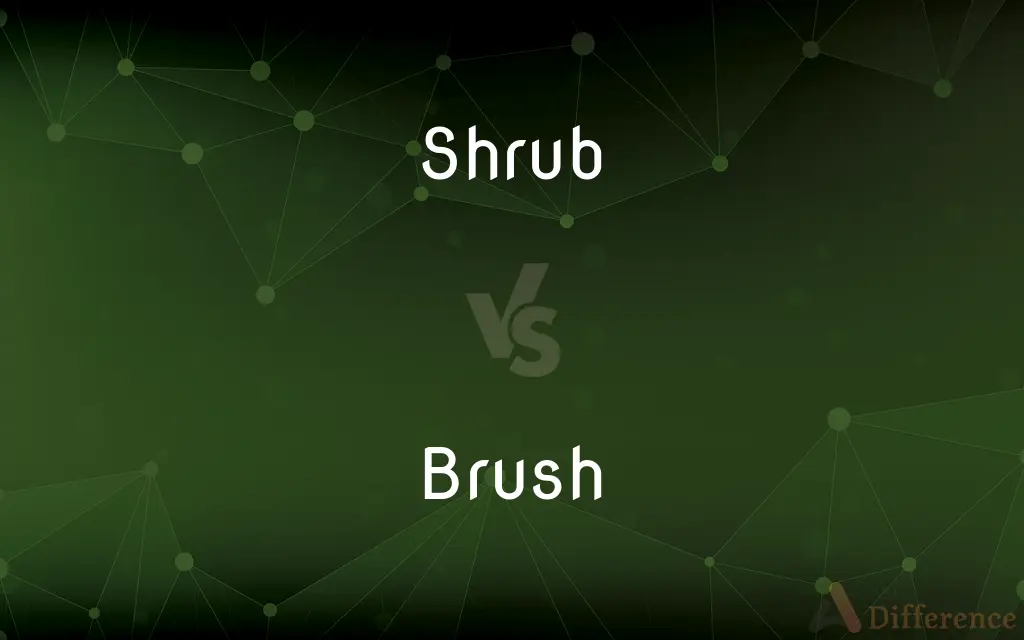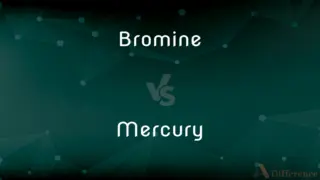Shrub vs. Brush — What's the Difference?
By Tayyaba Rehman & Maham Liaqat — Updated on April 3, 2024
Shrubs are woody plants with multiple stems and a short height, ideal for landscaping. Brush refers to dense vegetation, including shrubs, undergrowth, and small trees, often seen as obstacles in wild areas.

Difference Between Shrub and Brush
Table of Contents
ADVERTISEMENT
Key Differences
Shrubs are defined by their woody, multi-stemmed nature, typically growing less than 6 meters tall. They are often cultivated for their aesthetic value in gardens and landscapes. Brush, on the other hand, encompasses a wider variety of vegetation, including shrubs, undergrowth, and small trees. It's commonly found in wild or undeveloped areas and can sometimes be seen as unwanted or as an obstacle to clear.
While shrubs are specifically grown for decoration, delineation, or functional purposes in controlled environments like gardens and parks, brush represents a natural, untamed assembly of vegetation. This distinction highlights how humans interact with and manage different types of plant life for various purposes.
Shrubs usually require some level of maintenance, such as pruning, to retain their shape and health, emphasizing their role in designed landscapes. Brush, whereas, grows naturally and can thrive without human intervention, embodying the untamed aspect of nature.
Gardeners and landscapers select shrubs based on their aesthetic appeal, including flower, leaf color, and overall shape, which contribute to the visual design of a space. Conversely, brush is often removed for safety reasons, to reduce fire hazards, or to clear land for development, reflecting its often negative perception in human-dominated landscapes.
The management of shrubs involves deliberate planting and care, aiming to enhance or preserve a landscape's beauty. In contrast, managing brush often involves clearing it to prevent the spread of wildfires, to reclaim land for agricultural use, or to create defensible spaces in fire-prone areas.
ADVERTISEMENT
Comparison Chart
Definition
Woody plants with multiple stems, usually under 6 meters tall.
Dense vegetation including shrubs, undergrowth, and small trees.
Habitat
Cultivated in gardens, parks, and landscapes.
Found in wild, undeveloped areas or as undergrowth in forests.
Purpose
Aesthetic, delineation, or functional use in landscapes.
Often considered an obstacle or unwanted vegetation.
Maintenance
Requires pruning and care to maintain shape and health.
Grows naturally, may be removed for safety or land development.
Human Interaction
Planted and maintained for decorative purposes.
Often cleared for land use, safety, or to reduce fire hazards.
Compare with Definitions
Shrub
Can be evergreen or deciduous.
The evergreen shrubs provide year-round greenery in our garden.
Brush
Regarded as a fire hazard in certain areas.
Residents were advised to clear brush away from their homes to reduce fire risk.
Shrub
Requires maintenance such as pruning.
Pruning the shrubs helped maintain their shape and encouraged growth.
Brush
Dense vegetation, not specifically maintained.
The hiking trail was overgrown with brush, making navigation difficult.
Shrub
Diverse in species, offering various aesthetics.
The landscape architect recommended a mix of shrubs for seasonal colors.
Brush
Often cleared for safety or development.
Workers cleared the brush to prepare the land for the new building.
Shrub
Used in landscaping for decorative purposes.
We chose a variety of colorful shrubs to enhance our front yard.
Brush
Can be a natural habitat for wildlife.
The brush provided cover and food for small animals and birds.
Shrub
A low-growing woody plant with multiple stems.
The garden was bordered by neatly trimmed shrubs.
Brush
Includes small trees, undergrowth, and shrubs.
The fire spread quickly through the dry brush in the forested area.
Shrub
A shrub (or bush, but this is more of a gardening term) is a small- to medium-sized perennial woody plant. Unlike herbaceous plants, shrubs have persistent woody stems above the ground.
Brush
A brush is a common tool with bristles, wire or other filaments. It generally consists of a handle or block to which filaments are affixed in either a parallel or perpendicular orientation, depending on the way the brush is to be gripped during use.
Shrub
A woody plant of relatively low height, having several stems arising from the base and lacking a single trunk; a bush.
Brush
An implement with a handle and a block of bristles, hair, or wire, used especially for cleaning, applying a liquid or powder to a surface, or arranging the hair
A shaving brush
Shrub
A beverage made from fruit juice, sugar, and a liquor such as rum or brandy.
Brush
A light and fleeting touch
The lightest brush of his lips against her cheek
Shrub
A woody plant smaller than a tree, and usually with several stems from the same base.
Brush
The bushy tail of a fox.
Shrub
(Kenyan English) A word mispronounced by replacing some consonant sounds with others of a similar place of articulation due to interference from one's knowledge of an indigenous Kenyan language.
Brush
A drumstick with long wire bristles, used to make a soft hissing sound on drums or cymbals.
Shrub
A liquor composed of vegetable acid, fruit juice (especially lemon), sugar, sometimes vinegar, and a small amount of spirit as a preservative. Modern shrub is usually non-alcoholic, but in earlier times it was often mixed with a substantial amount of spirit such as brandy or rum, thus making it a liqueur.
Brush
A piece of carbon or metal serving as an electrical contact with a moving part in a motor or alternator.
Shrub
(obsolete) To lop; to prune.
Brush
Undergrowth, small trees, and shrubs.
Shrub
To mispronounce a word by replacing some consonant sounds with others of a similar place of articulation due to interference from one's knowledge of an indigenous Kenyan language.
Brush
Remove (dust or dirt) by sweeping or scrubbing
We'll be able to brush the mud off easily
Shrub
A liquor composed of vegetable acid, especially lemon juice, and sugar, with spirit to preserve it.
Brush
Touch lightly and gently
Stems of grass brush against her legs
Their fingers brushed as she took the glass from him
Shrub
A woody plant of less size than a tree, and usually with several stems from the same root.
Brush
An implement typically consisting of bristles fastened into a handle, used in scrubbing, polishing, grooming, or applying a liquid.
Shrub
To lop; to prune.
Brush
The act of using this implement.
Shrub
A low woody perennial plant usually having several major branches
Brush
A sweeping stroke of the hand, as in removing something.
Brush
A light touch in passing; a graze.
Brush
An instance of contact with something undesirable or dangerous
A brush with the law.
A brush with death.
Brush
A bushy tail
The brush of a fox.
Brush
A sliding connection completing a circuit between a fixed and a moving conductor.
Brush
A snub; a brushoff.
Brush
Dense vegetation consisting of shrubs or small trees.
Brush
Land covered by such a growth.
Brush
Cut or broken branches.
Brush
To clean, polish, or groom with a brush
Brush one's teeth.
Brush the dog's coat.
Brush
To apply with a brush
Brushed shellac onto the wood.
Brush
To remove with a brush or with sweeping strokes
Brushed dirt from his pants.
Brush
To touch lightly in passing; graze against.
Brush
To use a brush.
Brush
To make sweeping strokes with the hand.
Brush
To touch something lightly in moving past.
Brush
An implement consisting of multiple more or less flexible bristles or other filaments attached to a handle, used for any of various purposes including cleaning, painting, and arranging hair.
Brush
The act of brushing something.
She gave her hair a quick brush.
Brush
A piece of conductive material, usually carbon, serving to maintain electrical contact between the stationary and rotating parts of a machine.
Brush
A brush-like electrical discharge of sparks.
Brush
(uncountable) Wild vegetation, generally larger than grass but smaller than trees. See shrubland.
Brush
A short and sometimes occasional encounter or experience.
He has had brushes with communism from time to time.
Brush
The furry tail of an animal, especially of a fox.
Brush
(zoology) A tuft of hair on the mandibles.
Brush
(archaic) A short contest, or trial, of speed.
Brush
(music) An instrument, resembling a brush, used to produce a soft sound from drums or cymbals.
Brush
(computer graphics) An on-screen tool for "painting" a particular colour or texture.
Brush
(computer graphics) A set of defined design and parameters that produce drawn strokes of a certain texture and quality.
Downloading brushes for Photoshop
Brush
(video games) In 3D video games, a convex polyhedron, especially one that defines structure of the play area.
Brush
The floorperson of a poker room, usually in a casino.
Brush
Evergreen boughs, especially balsam, locally cut and baled for export, usually for use in making wreaths.
Brush
(transitive) To clean with a brush.
Brush your teeth.
Brush
(transitive) To untangle or arrange with a brush.
Brush your hair.
Brush
(transitive) To apply with a brush.
I am brushing the paint onto the walls.
Brush
(transitive) To remove with a sweeping motion.
'She brushes the flour off your clothes.
Brush
(ambitransitive) To touch with a sweeping motion, or lightly in passing.
Her scarf brushed his skin.
Brush
(intransitive) To clean one's teeth by brushing them.
Brush
An instrument composed of bristles, or other like material, set in a suitable back or handle, as of wood, bone, or ivory, and used for various purposes, as in removing dust from clothes, laying on colors, etc. Brushes have different shapes and names according to their use; as, clothes brush, paint brush, tooth brush, etc.
Brush
The bushy tail of a fox.
Brush
A tuft of hair on the mandibles.
Brush
Branches of trees lopped off; brushwood.
Brush
A thicket of shrubs or small trees; the shrubs and small trees in a wood; underbrush.
Brush
Land covered with brush{5}; in Australia, a dense growth of vegetation in good soil, including shrubs and trees, mostly small.
Brush
A bundle of flexible wires or thin plates of metal, used to conduct an electrical current to or from the commutator of a dynamo, electric motor, or similar apparatus.
Brush
The act of brushing; as, to give one's clothes a brush; a rubbing or grazing with a quick motion; a light touch; as, we got a brush from the wheel as it passed.
[As leaves] have with one winter's brushFell from their boughts.
Brush
A skirmish; a slight encounter; a shock or collision; as, to have a brush with an enemy; a brush with the law.
Let grow thy sinews till their knots be strong,And tempt not yet the brushes of the war.
Brush
A short contest, or trial, of speed.
Let us enjoy a brush across the country.
Brush
To apply a brush to, according to its particular use; to rub, smooth, clean, paint, etc., with a brush.
Brush
To touch in passing, or to pass lightly over, as with a brush.
Some spread their sailes, some with strong oars sweepThe waters smooth, and brush the buxom wave.
Brushed with the kiss of rustling wings.
Brush
To remove or gather by brushing, or by an act like that of brushing, or by passing lightly over, as wind; - commonly with off.
As wicked dew as e'er my mother brushedWith raven's feather from unwholesome fen.
And from the boughts brush off the evil dew.
You have commissioned me to paint your shop, and I have done my best to brush you up like your neighbors.
Brush
To move nimbly in haste; to move so lightly as scarcely to be perceived; as, to brush by.
Snatching his hat, he brushed off like the wind.
Brush
A dense growth of bushes
Brush
An implement that has hairs or bristles firmly set into a handle
Brush
Momentary contact
Brush
Conducts current between rotating and stationary parts of a generator or motor
Brush
A minor short-term fight
Brush
The act of brushing your teeth;
The dentist recommended two brushes a day
Brush
The act of brushing your hair;
He gave his hair a quick brush
Brush
Contact with something dangerous or undesirable;
I had a brush with danger on my way to work
He tried to avoid any brushes with the police
Brush
Rub with a brush, or as if with a brush;
Johnson brushed the hairs from his jacket
Brush
Touch lightly and briefly;
He brushed the wall lightly
Brush
Clean with a brush;
She brushed the suit before hanging it back into the closet
Brush
Sweep across or over;
Her long skirt brushed the floor
A gasp swept cross the audience
Brush
Remove with or as if with a brush;
Brush away the crumbs
Brush the dust from the jacket
Brush aside the objections
Brush
Cover by brushing;
Brush the bread with melted butter
Common Curiosities
What distinguishes a shrub from brush?
A shrub is a specific type of plant with a woody, multi-stemmed base, while brush includes a mix of vegetation, including shrubs, found in wild areas.
How do you maintain a shrub?
Maintenance includes regular pruning, watering, and fertilizing to ensure health and desired shape.
Can a shrub be part of brush?
Yes, shrubs can be part of brush when they grow in the wild alongside other dense vegetation.
Can brush removal impact ecosystems?
Yes, removing brush without consideration can disrupt local ecosystems and wildlife habitats.
Is brush always considered undesirable?
Not always; while often seen as an obstacle, brush can provide important habitats for wildlife and contribute to biodiversity.
Why might someone choose to clear brush from their property?
Reasons include reducing fire risk, making space for development, or improving visibility and access.
Why are shrubs important in landscaping?
Shrubs add aesthetic value, create borders, and can serve functional purposes in a landscape.
What are the risks associated with brush?
Brush can pose fire risks, especially in dry conditions, and may need to be managed or cleared to mitigate hazards.
How can brush clearance impact water resources?
Removing brush can reduce water uptake by vegetation, potentially increasing available groundwater but also may lead to increased erosion.
Are there benefits to leaving brush in natural areas?
Leaving brush can support biodiversity, offering habitats and resources for various species.
What are some common uses of shrubs in gardens?
Shrubs are used for privacy, decorative borders, and to add structure to garden designs.
What considerations should be made when choosing shrubs for landscaping?
Considerations include climate, soil type, water availability, and the desired aesthetic effect.
Can shrubs be used to prevent erosion?
Yes, the root systems of shrubs can help stabilize soil and prevent erosion.
How does brush affect fire management strategies?
Managing brush involves clearing or reducing it to prevent or slow the spread of wildfires.
What are some ecological considerations when managing brush and shrubs?
Considerations include preserving native species, supporting wildlife, and maintaining natural landscapes.
Share Your Discovery

Previous Comparison
Bromine vs. Mercury
Next Comparison
Theory vs. PhilosophyAuthor Spotlight
Written by
Tayyaba RehmanTayyaba Rehman is a distinguished writer, currently serving as a primary contributor to askdifference.com. As a researcher in semantics and etymology, Tayyaba's passion for the complexity of languages and their distinctions has found a perfect home on the platform. Tayyaba delves into the intricacies of language, distinguishing between commonly confused words and phrases, thereby providing clarity for readers worldwide.
Co-written by
Maham Liaqat













































